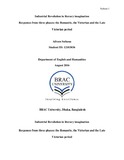| dc.contributor.advisor | Ahmed, Nawshaba | |
| dc.contributor.author | Sultana, Afreen | |
| dc.date.accessioned | 2017-03-20T06:27:47Z | |
| dc.date.available | 2017-03-20T06:27:47Z | |
| dc.date.copyright | 2016 | |
| dc.date.issued | 2016-08 | |
| dc.identifier.other | ID 12103036 | |
| dc.identifier.uri | http://hdl.handle.net/10361/7925 | |
| dc.description | This thesis is submitted in partial fulfillment of the requirements for the degree of Bachelor of Arts in English, 2016. | en_US |
| dc.description | Cataloged from PDF version of thesis. | |
| dc.description | Includes bibliographical references (page 38-40). | |
| dc.description.abstract | Industrial revolution is mainly started from 1750-1850 which transformed England dramatically from rural agricultural to urban industrial society. It encompasses main literary periods from Romantic and Victorian to late Victorian era. Most of the writings of these periods reflect the effects of Industrial revolution. The impacts of industrial revolution in literature are depicted through the literary piece of romantic poets and Victorian writers. Wordsworth who changed the phenomena of literary studies builds his poetry on nature. He portrayed the difference between urbanization and pastoralization. ST Coleridge also shows his loves towards nature through the poem '' To nature'' that clearly shows his rejection to industrial cities. William Blake illustrates the struggling of human life through the poem '' The Chimney Sweeper''. He showed the ruthless fact of the industrial society. The Victorian novelist Charles Dickens exposes the transformed Victorian society through his novels, Oliver Twist, Great Expectation, Hard Times. The characters of the novels are the victims of the industrial society that suffers from class differences, mechanization, poor law and judiciary system, child labour of that time. Through the novel North and South Elizabeth Gaskell shows the difference between urban north and rural south. She also exposes the city life, class struggling, relation between master and workers which was nothing but a consequences of industrial revolution. Thomas Hardy's Far from the Madding Crowd written in late Victorian era successfully represents the rural agricultural society and tradition that was threatened by the mechanization of industrial cities. The novel clearly depicts the ruthless effect of industrial revolution, such as capitalism and class discrimination. | en_US |
| dc.description.statementofresponsibility | Afreen Sultana | |
| dc.format.extent | 40 pages | |
| dc.language.iso | en | en_US |
| dc.publisher | BRAC University | en_US |
| dc.rights | BRAC University thesis are protected by copyright. They may be viewed from this source for any purpose, but reproduction or distribution in any format is prohibited without written permission. | |
| dc.subject | Literary imagination | en_US |
| dc.subject | Late victorian period | en_US |
| dc.subject | Victorian period | en_US |
| dc.subject | Romantic period | en_US |
| dc.title | Industrial revolution in literary imagination responses from three phases: the romantic, the victorian and the late victorian period | en_US |
| dc.type | Thesis | en_US |
| dc.contributor.department | Department of English and Humanities, BRAC University | |
| dc.description.degree | B.A. in English | |

